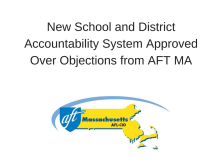The Massachusetts Board of Elementary and Secondary Education, by a 7-2 vote on June 26, approved revisions to the state’s school and district accountability system over strenuous objections from the state’s two teachers unions, who argued that the new system is by and large a continuation of the failed and discredited status quo.

AFT MA submitted extensive public comments on May 15, offering a detailed critique of the new system and alternatives for moving forward. The Massachusetts Teachers Association emphasized similar themes in their public comments. The Board ignored these comments from the two teachers unions in approving the final set of amendments to the accountability regulations and system at its June 26 regular meeting.
The two dissenting votes came from Mary Ann Stewart, the parent representative on the Board, and Ed Doherty, the Board’s labor representative. Doherty’s remarks, in which he articulated his objections to the new system, can be found at the 51:00 mark of this video.
The new system eliminates the Level 1 to 5 labeling configuration that was central to the old system, a change touted by the Department of Elementary and Secondary Education (DESE) as a key shift. However, AFT MA has noted that a vertical hierarchy with five levels has simply become a horizontal categorization with five or six categories; therefore, the same basic policy structure remains in place.
“It’s as if the old Level 1 to 5 schematic was simply rotated 90 degrees counter-clockwise,” said Murphy. “What was vertical is now horizontal. There was very little innovation in the Department’s thinking, despite the many good ideas that were offered.”
Another troubling feature is that the new system retains the “school percentile” metric. This measure ranks schools relative to each other, using MCAS scores as the predominant factor in a complicated algorithm. The measure guarantees that there will always be a “lowest X percent” of schools, even if all schools are improving and getting good results.
AFT MA has argued that the school percentile measure is systematically biased against schools serving large numbers of high-need students, given the strong correlation between socioeconomic status and MCAS scores. The measure, according to AFT MA, also pits schools and students against each other in an unhealthy competition, discouraging collaboration and the sharing of best practices.
“With the school percentile metric, if one school does well, it comes at another school’s expense,” explained Murphy. “It’s a zero-sum game that guarantees winners and losers.”
DESE says that it will use the new system to classify districts and schools beginning in fall 2018 based on data from the 2017-18 school year. AFT MA and others have raised concerns about that accelerated timetable, given that districts and schools have had little time to absorb or adjust to the details of the new system.
AFT MA will be preparing materials to help leaders and members understand the new system. In the meantime, resources from DESE are listed below. AFT MA members who have questions can also contact Dan Murphy, AFT MA’s director of educational policy, at dmurphy@aftma.net.
DESE Resources on New Accountability System
